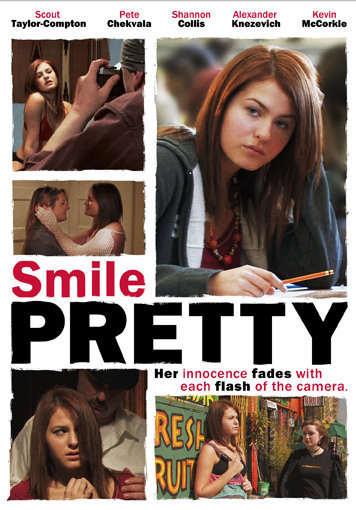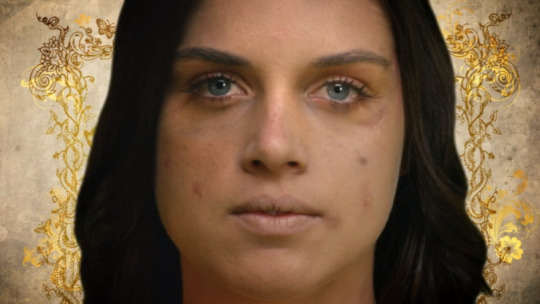#Florence Burnier-Bauer
Text
SMILE PRETTY
This is not a good movie, and I can't stop thinking about it. It is barely competent, technically, and I'm not sufficiently confident that it sets the right tone in its discussion of its excruciatingly difficult subject. However, I can't seem to stop thinking about it, so I guess I have to record my feelings here, even though I am hesitant to force anyone else to think about this. Reader be warned.
[N.B. I literally gave myself a panic attack writing this. What started out as an intellectualizing assessment of a troubling film turned into a long, grueling, extremely detailed account of my full personal understanding of sexual abuse. If that sounds like it is going to cost you sleep, please do not proceed.
On a further note, in this piece, I often use the terms "victim" and "survivor" interchangeably. I understand the importance of being able to identify as a survivor, rather than wear the inappropriately subjugating and finalizing mantle of victim. In this case, it is necessary for me to use the term "victim" to differentiate between the ongoing "survivor" experience, and the immediate, contemporaneous experience of abuse.]

I blithely selected SMILE PRETTY, in total ignorance, on a streaming site, strictly because Scout Taylor-Compton is in it. She is so effective in Rob Zombie's fraught HALLOWEEN remakes that I felt compelled to watch this tacky-looking movie, even though I was turned off by the premise, about a child pornography survivor. ALSO, I just now looked up some information about SMILE PRETTY to prep for this review--I hadn't done so before, because the movie seemed too crude to have been made by anyone I would have heard of--and I was very alarmed to discovered that it was directed by Harry Bromley Davenport, who made all three XTRO movies. Now I'm even more bothered than before...
In SMILE PRETTY, Scout Taylor-Compton plays teenage Nastalia, better known as Nasty, the ongoing victim of a child porn operation run by her uncle, who has been perpetrating and recording her rape for most of her life. A glimmer of hope emerges when she has a chance encounter with Matt, a 20-something white knight who makes a big show of encouraging Nasty to escape her uncle, and rebuffing her ingrained seductive behavior. (played by Peter Chekvala, who looks just like a chav Paul Rudd to me, which should be funny, but it is impossible to experience anything like joy during this movie) Of course, it turns out that Matt actually knows Nasty well from her uncle's widely circulated output, and their meeting was no coincidence. A brief conflict resolves itself in a consummated sexual relationship, after Matt lays out his own sob story: He, too, was molested as a child, so therefore he can't help being a pedophile, and deserves Nasty's sympathy and support. Nasty thinks she has found love with someone who truly understands her, but soon enough, Matt starts using her to bring in younger sexual partners for the two of them--or just for him. Nasty finally becomes disillusioned with Matt when their latest third, 14 year old Samantha (the excellent Shannon Collis), becomes Matt's new primary partner. Realizing that Matt has lost interest because Nasty is approaching adulthood, she finally alerts the authorities and escapes this lifelong cycle of abuse.

As I mentioned, this is what I would ordinarily call "barely a movie". The video quality is crap, so is the sound, and I often found the general manner of filmmaking overly indulgent, as if the director might be telling this cautionary tale as a flimsy excuse for his own interest in young girls. It just seemed to have that grimy, tonally dissonant vibe. However, the performances by both women are roundly superb, and the screenplay by Rachel Calendar has a feeling of authenticity that I found impossible to ignore. The construction of Nasty's character is just too psychiatrically accurate--her sexual forwardness, which she literally cannot control due to her abusive upbringing, her relentless desire to impress and please older men (her partner's arousal is her only source of personal arousal, at whatever cost to herself), her valuation of herself only in terms of her sexual viability--all of these things are vividly articulated, and textbook perfect. The character of Matt is also unnervingly familiar from real life: A narcissistic and manipulative Abuser who wields his own Abused status as a shield, or even a weapon against anyone who rightly accuses him of malice, or tries to stand between him and the greedy indulgence of his slightest whim.

(Artist and survivor Florence Burnier-Bauer in MY TALK WITH FLORENCE)
More disturbing than all of this, is Calendar's unbearably frank discussion of an aspect of child abuse that is seldom addressed: That when an innocent person is induced into a victimizing sexual encounter, they still experience the pleasure that comes from the physical stimulus. Last year, I watched a documentary called MY TALK WITH FLORENCE, in which a victim of lifelong sexual abuse (beginning with her family, and ending with a powerful cult) speaks ferociously about the fallacy of rape as a purely painful experience. Her point is that if we believe that physical evidence of pleasure on the part of the victim means that their assault cannot be defined as rape, then we deprive huge numbers of survivors of their claims. She uses the example of male victims having involuntary, unwanted erections, a biological fact which is used to support the absurd notion that men and boys cannot be raped. Even more to the point, the word I used to describe the confusion of childhood abuse, "innocent", isn't a mandatory ingredient in this noxious emotional brew--even a violent attack will produce a physical reaction. The body can play cruel tricks like this to protect itself from being torn apart from force and friction. I have heard many times the phrase used by Alison Botha in the documentary ALISON, about her brutal rape, disembowelment, and near-decapitation by a pair of strangers: "My body betrayed me." In the case of SMILE PRETTY, there is an unfortunately unforgettable sequence in which Nasty, Samantha and Matt all reminisce about their experiences. They describe their own rapes with an almost gleeful defiance, proclaiming defensively that they each actually enjoyed their dehumanizing sexual initiation at the hands of predatory relatives and babysitters. It is painfully clear that they are trying to justify the shame of their involuntary physical pleasure, by pretending to own it. In the following scene, Samantha listens intently through the wall as Matt and Nasty have sex with more vigor than he has recently managed to summon; all of this detailed reminiscence has thrust the three survivors into a state of hypnotic arousal. Watching this, I was rudely reminded of a conversation I once had with a friend, who suddenly and matter-of-factly recounted an occasion on which an especially shitty college boyfriend raped her, just to conclude an argument. My friend stonily declared, "I didn't give a shit. I was fine." This may not be the same as trying to own the "pleasure" of being assaulted, but it had a similar aspect of trying to own the rape, of trying to reject victimhood by claiming to accept the traumatic event. Though I never forgot it, I try not to think about it. SMILE PRETTY made this impossible.

(Alison Botha in the strange and shattering documentary ALISON)
And here I am, days later, still thinking about this movie I may wish I had never seen. I'm not sure what I got out of it. I'm not sure what anyone would get out of it, who does not know intuitively or factually about these intimate realities of sexual abuse. I rarely feel that I would rather not have seen a movie--my usual philosophy is that as long as an experience moved you in some way, even a displeasurable way, then it was somehow worth the undertaking. In the case of SMILE PRETTY, my resolve may have been tested, and failed. The jury is still out.
#tw: abuse#tw: rape#tw: csa#tw: child abuse#tw: everything#smile pretty#harry bromley davenport#blogtober#Scout Taylor-Compton#shannon collis#my talk with florence#Florence Burnier-Bauer#alison botha#survivor#documentary#drama#rachel calendar
11 notes
·
View notes